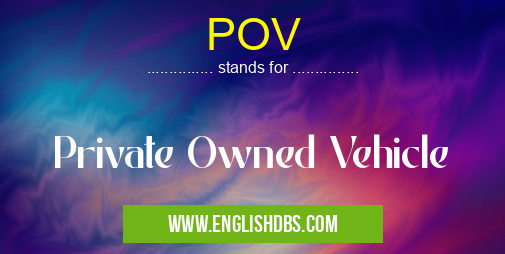What does POV mean in TRANSPORTATION
POV stands for Private Owned Vehicle. It is a term used in the governmental sector to describe any kind of vehicle that is owned by an individual or family, rather than a business or government entity. The term has become more common in recent years due to the rise in use of vehicles for both personal and professional transportation. POVs are often associated with private vehicle ownership and operation and have been the subject of much debate in terms of taxes, emissions, and other safety regulations.

POV meaning in Transportation in Governmental
POV mostly used in an acronym Transportation in Category Governmental that means Private Owned Vehicle
Shorthand: POV,
Full Form: Private Owned Vehicle
For more information of "Private Owned Vehicle", see the section below.
Definition
Private Owned Vehicles (POVs) are defined as any motorized vehicle owned or leased by an individual or family rather than a business or governmental agency. These vehicles can include cars, trucks, motorcycles, boats, or recreational vehicles that are used primarily for personal transport. The term is used widely by the government to refer to privately owned vehicles when it comes to taxation and enforcement of safety regulations and other laws such as emissions testing.
Uses
POVs are mainly used as personal vehicles for day-to-day transportation, but they can also be used for commercial purposes such as rental car companies or delivery services like UberEats or Postmates. POVs are typically registered with state motor vehicle departments in order to legally operate them on public roads. The registration process includes filling out paperwork to get a title, license plate number, insurance coverage, and inspection stickers depending on your state's specific rules. Registration fees vary by state but generally consist of an initial fee plus taxes and/or fees based on the value of the vehicle.
Pros & Cons
The primary benefit of owning a private owned vehicle (POV) is convenience - you don't have to rely on public transportation or ride-sharing services such as Uber and Lyft whenever you need to go somewhere. Additionally, having your own car allows you greater control over your traveling preferences since you can choose where you want to go without worrying about someone else's schedule or route preferences. However, there are also drawbacks - ownership costs include registration fees along with regular maintenance costs like fuel expenses, tire rotations/replacements, oil changes etc., which can add up quickly over time if not managed properly. There may also be additional taxes imposed on cars depending on their weight classifications in certain states or localities which could drive up the overall cost further
Essential Questions and Answers on Private Owned Vehicle in "GOVERNMENTAL»TRANSPORTATION"
What is a Private Owned Vehicle (POV)?
A Private Owned Vehicle (POV) is a motor vehicle owned by and registered with an individual or family for their own private use. This could include vehicles such as cars, vans, SUVs, motorcycles, boats, recreational vehicles (RVs), scooters, aircraft and more.
How do I obtain a POV registration?
In order to obtain a registration for a POV you will need to contact your local DMV office to inquire about the specific requirements in your state or territory that must be met in order to register the vehicle. It's important that all registration requirements are met in order to avoid any legal complications down the road.
Can I register my POV with another person?
Yes, it is possible to register your POV with another person if they meet the requirements listed by your local DMV office. Typically this will involve having them sign paperwork indicating they are responsible for the vehicle and agree to any terms necessary for registration. It's important that both parties understand and adhere to these rules before registering together.
Do I need insurance coverage when registering my POV?
Yes, all vehicles registered with your state's DMV require proof of insurance coverage in order to proceed with registration. Make sure you provide documentation showing that you have sufficient liability coverage before attempting to register your vehicle.
Is there a grace period for registering my POV?
Generally speaking, most states provide some sort of grace period when trying to register a newly purchased or inherited vehicle. However, this grace period varies depending on location and can range from 10 days up to 90 days. Contact your local DMV office for information specifically related to registering in your state or territory.
Are there restrictions on how many people can be included on a POV title?
Generally speaking no; however it depends on the laws of each state so it's important that you contact your local DMV office before attempting shared ownership of any type of vehicle. They will be able to provide any specific information pertaining fraud prevention laws regarding shared ownership titles within their jurisdiction.
POV also stands for: |
|
| All stands for POV |
